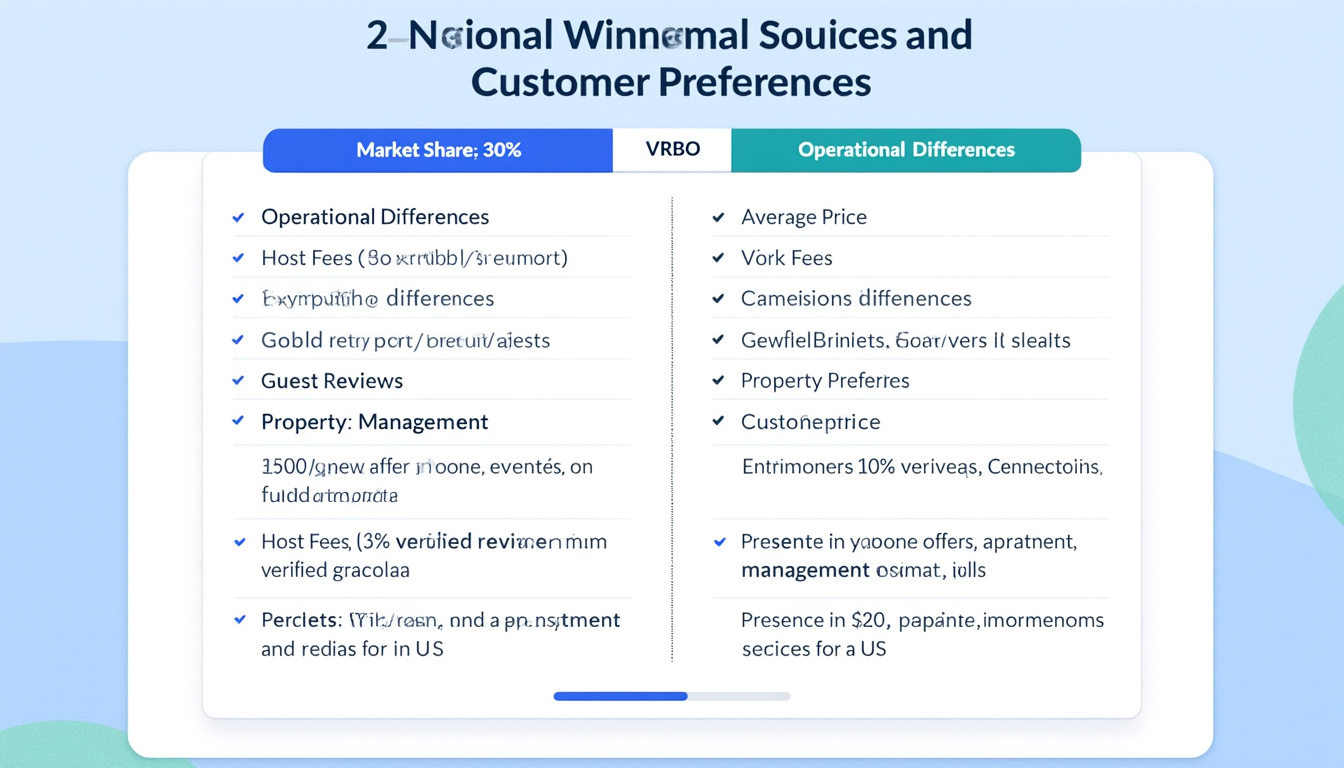Recent actions in the competitive landscape of vacation rentals have captured attention. Airbnb’s response to Vrbo’s advertising campaign demonstrates a turbulent rivalry. This article delves into the marketing tactics employed, the overarching trends defining the vacation rental sector, and insights for property owners navigating these waters.
- Overview of the Vrbo billboard campaign
- Airbnb’s critique and strategic positioning
- Market analysis of Airbnb versus Vrbo
- Insights and recommendations for property owners
Overview of the Vrbo billboard campaign
In early 2024, Vrbo launched a striking billboard campaign aimed directly at its rival, Airbnb. These billboards, strategically placed in high-traffic areas like San Francisco and New York, boast messages designed to make Vrbo appear as the more desirable choice for vacation rentals. One such billboard near Airbnb’s headquarters humorously declared, “Think of us as Airbnb’s hotter, cooler, friendlier, long-lost twin that never has hosts. Make it a Vrbo.”
Such bold messaging reflects a deliberate effort by Vrbo to carve a niche within the market. The brand’s spokesperson pointed out that travelers often seek out privacy and entire homes rather than shared spaces. This positioning is in stark contrast to Airbnb’s model, which includes shared accommodations. The “Make It a Vrbo” campaign, which also featured billboards across major cities like Dallas, Chicago, and Atlanta, was designed not only to promote Vrbo but to critique the broader vacation rental category.
Vrbo’s marketing push has not gone unnoticed. While some may view it as a clever attempt to gain visibility, critics of the campaign argue that it comes off as desperate. Airbnb’s officials quickly responded, stating, “Vrbo just spent millions on ads that appear to be as confused as they are desperate, giving Airbnb more visibility than their own name.” This pointed critique emphasizes Airbnb’s established presence in the market and questions the effectiveness of Vrbo’s strategy.
The Strategies Behind the Campaign
Understanding Vrbo’s advertising strategy requires a look into its core messaging. The campaign is built around the notion that privacy is paramount for travelers. By dismissing shared rentals, Vrbo taps into a concern that many potential customers feel—awareness about the types of accommodations offered can heavily influence the choice of provider for vacation rentals.
The campaign’s impact is further emphasized by its timing. Launching during high-traffic events like the NFL playoffs, Vrbo aimed to maximize visibility. Such strategic timing can amplify messaging and capture the attention of potential travelers, aligning with times when families and individuals plan vacations. Some billboards even address specific frustrations travelers associate with both Airbnb and the vacation rental sector.
The placement of billboards in notable locations like Bryant Park has also been strategic. Choosing such high-footfall areas ensures that the message reaches a wider audience. Vrbo aims to position itself not just as a competitor to Airbnb but as a preferable alternative for users seeking family-oriented or privacy-focused accommodations.
Public Reception and Impact of the Campaign
The public reception to Vrbo’s campaign has been a mixed bag. Some consumers appreciate the straightforwardness of its messaging, feeling it resonates with their desires for classic vacation experiences. On the other hand, the billboards have drawn criticism for the aggressive approach they take. Observers have noted the thin line between effective advertising and perceived desperation. This campaign represents a pivotal moment, showcasing the lengths companies will go to carve out space in the competitive realm of vacation rentals.
Airbnb, for its part, has not merely stood by silently. The company’s CEO, Brian Chesky, even included an image of one of the billboards in an Instagram story, perhaps as a means to turn the eye-catching effort by Vrbo into fodder for discussions about brand loyalty and competition. The ripple effect of Vrbo’s campaign continues through various media, as discussions surrounding brand identity and market trust become increasingly pertinent within the hospitality sector.

Market analysis of Airbnb versus Vrbo
The competition between Airbnb and Vrbo underlines significant trends within the vacation rental market, particularly as both brands maneuver for a larger share. According to Skift Research, by 2024, Airbnb maintained a substantial lead with a 44% market share in global short-term rentals compared with Vrbo’s 9%. This data spotlights the dominance of Airbnb within the sector, suggesting Vrbo faces an uphill battle in making sizable inroads.
One pivotal aspect distinguishing the two platforms lies in their operational models. As highlighted by various studies, Airbnb allows hosts to rent out single rooms, shared accommodations, or entire properties. In contrast, Vrbo focuses exclusively on entire home rentals— a model that appeals to families and groups looking for privacy during travel. This difference effectively sets up distinct marketing aims and operational strategies.
Consumer Behavior Trends
Changing consumer preferences play a significant role in shaping the vacation rental market landscape. The desire for privacy, especially in a post-pandemic world, has influenced many travelers to seek rentals that offer isolation from others. Consumers are moving towards experiences that offer more than just a bed for the night. They want entire homes that provide a sense of comfort and familiarity during their travels.
Understanding these trends is essential for businesses within the sector. The growing inclination towards family-friendly and spacious accommodations often reflects a broader cultural shift. As more families decide to vacation together, platforms that offer entire homes are likely to gain traction. This is where Vrbo positions itself strategically, promoting its focus on holistic vacation experiences.
Future Projections
Looking ahead, the future of both Airbnb and Vrbo seems poised for further evolution. With Airbnb’s dominance, questions arise regarding how Vrbo can effectively differentiate itself in this competitive landscape. Future market dynamics could be influenced by regulatory changes, consumer sentiment, and marketing effectiveness. Adjustments in advertising might bolster Vrbo’s presence, but only if backed by consumer-centric services.
Data-driven marketing strategies could prove crucial. Enhanced understanding of user preferences and tweaking service offerings could play a role in market positioning. For instance, if Vrbo emphasizes unique family-friendly experiences or property ownership initiatives, it might offset some of Airbnb’s legacy advantages. Thus, the interaction between consumer behavior and strategic advertising remains central to market competitiveness.

Insights and recommendations for property owners
As a vacation rental owner, navigating advertising and positioning amidst competitive pressures is essential for success. This landscape requires keen awareness of market dynamics, emerging trends, and effective marketing strategies. By understanding the competitive battle between Airbnb and Vrbo, property owners can better position their offerings to attract potential guests.
Attracting the Right Audience
Determining the target audience is a primary consideration. Understanding whether to cater to families seeking entire homes of privacy or groups looking for fun shared experiences can make a significant difference in marketing approach. Airbnb’s model supports shared accommodations that encourage community interaction. Drawing inspiration from this model, property owners can decide to enhance guest experience and capitalize on social dynamics.
On the flip side, if targeting families, advertising should lean into presenting large spaces equipped with family-friendly amenities. Highlighting features like private gardens, spacious living areas, and a good location can draw families looking for uncrowded, home-like experiences. Potential guests will be seeking properties that provide comfort and memoires rather than merely a place to stay.
Leveraging Digital Marketing Strategies
Incorporating tailored digital marketing strategies can also provide leverage. Social media platforms allow property owners to showcase unique aspects of their offerings through visual content. Engaging visual storytelling via platforms like Instagram can attract interest and generate bookings. Further, developing an informative presence on platforms such as Facebook increases visibility and fosters trust with potential guests.
Moreover, enhancing direct booking services potentially allows owners to bypass commission charges often linked with third-party platforms. Building your website or landing page can showcase properties effectively and facilitate direct connections with guests. Highlighting customer testimonials and showcasing quality photos of the property can nurture trust while encouraging inquiries.
Staying Updated with Regulations
Property owners must stay informed about any changing regulations regarding vacation rentals in their respective regions. Compliance with local laws not only promotes a sustainable business model but also reinforces trust with guests. It’s advisable to join property owner associations as they often provide updates and resources for dealing with regulations.
Another significant aspect includes understanding market positioning. Adjusting pricing strategies in accordance with peak seasons while keeping an eye on competitive pricing can enhance visibility. Property owners should remain adaptable, ready to adjust marketing strategies and offering characteristics based on market demands.
